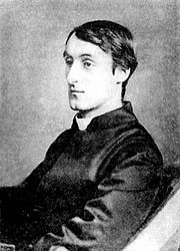|
Биография Gerard Manley Hopkins
Gerard Manley Hopkins, S.J. (28 July 1844 – 8 June 1889), was an English poet, Roman Catholic convert, and Jesuit priest, whose 20th-century fame established him posthumously among the leading Victorian poets. His experimental explorations in prosody (especially sprung rhythm) and his use of imagery established him as a daring innovator in a period of largely traditional verse.
He was educated at Highgate School and then Balliol College, Oxford, where he studied classics. Hopkins was an unusually sensitive student and poet, as witnessed by his class-notes and early poetic pieces. It was at Oxford that he forged a friendship with Robert Bridges (eventual Poet Laureate of England) which would be of importance in his development as a poet, and his posthumous acclaim.
Hopkins began his time in Oxford as a keen socialite and prolific poet, but he seemed to have alarmed himself with the changes in his behaviour that resulted, and he became more studious and began recording his sins in his diary. In particular, he found it hard to accept his sexuality; hence, he began to exercise strict self-control in regard to it, especially after he became a follower of Henry Parry Liddon and of Edward Pusey, the last, lingering member of the original Oxford Movement. It was during this time of intense scrupulosity that Hopkins seems to have begun confronting his strong homoerotic impulses. (See section below on Erotic influences)
Hopkins chose the austere and restrictive life of a Jesuit and was at times gloomy. The brilliant student who had left Oxford with a first class honours degree failed his final theology exam. This failure almost certainly meant that, though ordained in 1877, Hopkins would not progress in the order. Though rigorous and sometimes unpleasant, his life during Jesuit training had at least some stability; the uncertain and varied work after ordination was even harder on his sensibilities. In 1874 he returned to Manresa House to teach classics. He then went to St Beuno's College in North Wales for three years of theological studies. He served in various parishes in London, Chesterfield, Oxford, Liverpool and Glasgow. He taught Greek and Latin at Mount St Mary's College, Sheffield, and Stonyhurst College, Lancashire. In 1884 he became professor of Greek literature at University College Dublin. His English roots and his disagreement with the Irish politics of the time, as well as his own small stature (5'2"), unprepossessing nature and own personal oddities meant that he was not a particularly effective teacher. This as well as his isolation in Ireland deepened his gloom and his poems of the time, such as I Wake and Feel the Fell of Dark, reflected this. They came to be known as the "terrible sonnets," not because of their quality but because according to Hopkins's friend Canon Dixon, they reached the "terrible crystal," meaning that they crystallized the melancholy dejection which plagued the later part of his life.
After suffering ill health for several years and bouts of diarrhea, Hopkins died of typhoid fever in 1889 and was buried in Glasnevin Cemetery, Dublin.
Though he suffered from what today might be diagnosed as manic depression, and battled a deep sense of anguish throughout his life, upon his death bed, he evidently overcame some of his feelings of despondency, at times stygian in their intensity. His last words were "I am so happy, I am so happy."
|





